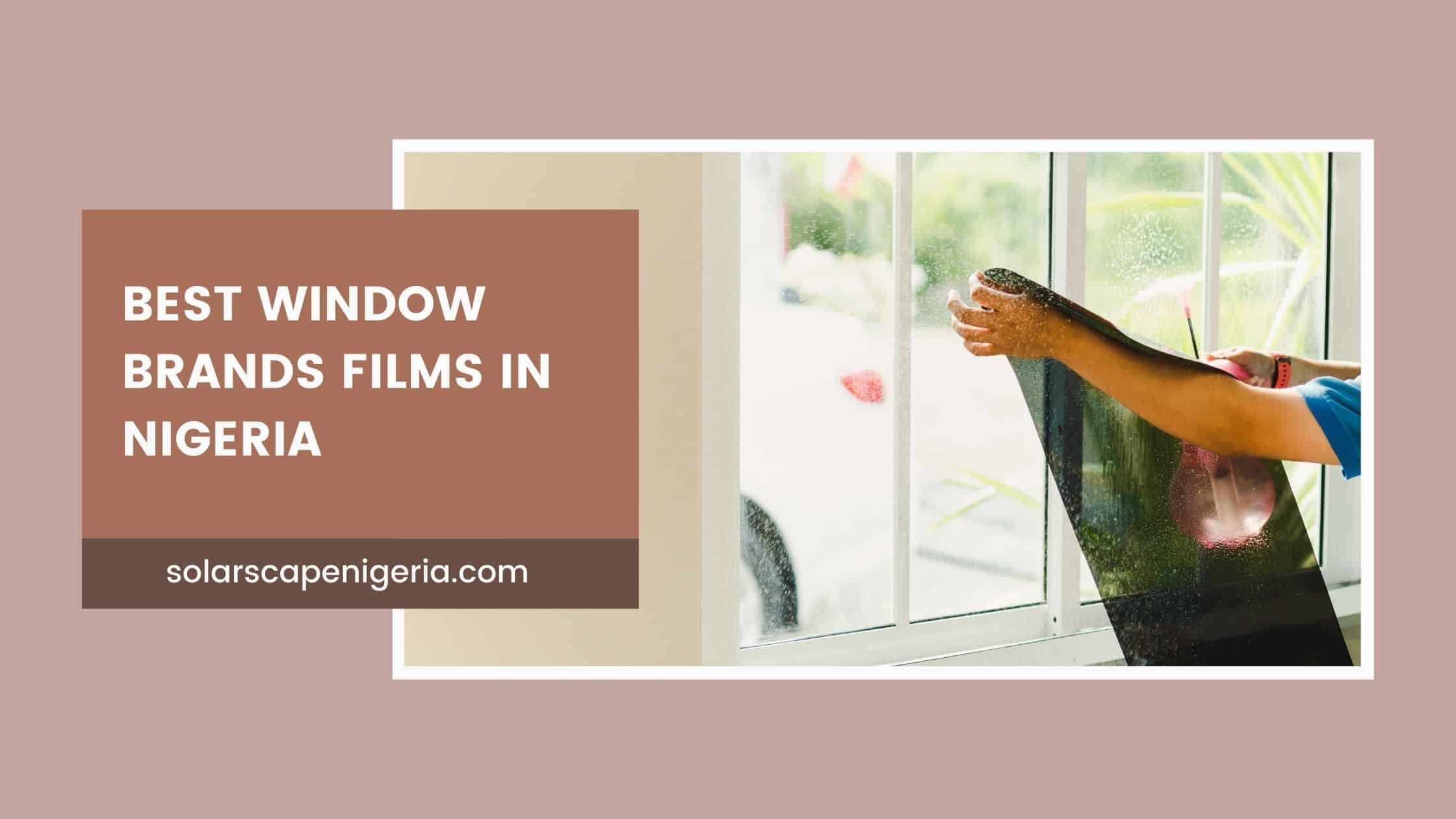Introduction
Window tinting is a smart and strategic investment for both residential and commercial properties. Whether you’re seeking energy efficiency, UV protection, or enhanced privacy, installing a high-quality window film can significantly improve your building’s comfort and aesthetics. However, like any building upgrade, window tinting can face issues—especially if not installed properly. Among all the challenges, several problems stand out as the most common: window film bubbling, delamination, fading, and peeling.
These prevalent issues affect countless installations of commercial window film and home window film alike. In this post, we’ll delve deep into what causes these problems, how they impact the effectiveness of your tint, and most importantly, how to prevent and fix them. We’ll also cover why professional commercial window film installation matters, and how choosing a reputable provider like Solar Scape Nigeria can save you time, money, and frustration.
What Is Window Film Bubbling?

Window film bubbling refers to the formation of air or moisture pockets between the glass surface and the film itself. These bubbles not only affect the visual appearance of your windows but can also reduce the functional benefits of the film. While minor bubbling may sometimes resolve itself during the curing process, persistent or widespread bubbling is a sign of a deeper issue.
Common Causes of Bubbling in Commercial and Home Window Film
Several factors can lead to bubbling, and identifying the root cause is essential for resolving the issue effectively. Here are the most common reasons:
1. Poor Installation
Improper application is the leading cause of bubbles in window film. If the film is not correctly aligned, or if dirt and dust are trapped during the process, air pockets are inevitable. This is why window film installation should always be entrusted to certified professionals.
2. Low-Quality Film
Not all window films are created equal. Low-cost, poor-quality films may not adhere properly or may degrade faster, leading to bubbling and peeling over time.
3. Environmental Conditions
High humidity, direct sunlight, or extreme temperature changes during installation can interfere with the adhesive process, increasing the likelihood of bubbling.
4. Aging and Wear
Over time, even well-installed film can develop bubbles if the adhesive begins to break down. This is more common in older films that haven’t been maintained or replaced as needed.
Delamination of Window Films

Delamination occurs when the multiple layers of window film begin to separate, often resulting in an uneven appearance and reduced performance. It’s especially problematic in window tinting, where large surface areas magnify visible imperfections.
Causes of Delamination
- Use of incompatible film types
- Exposure to excessive heat or moisture
- Low-quality adhesives
- Poor installation practices
Prevention and Solution
- Choose high-grade commercial window film designed to resist layer separation.
- Ensure the film is installed by experienced professionals.
- Control indoor humidity and temperature to avoid stress on the film.
- If delamination has started, the only long-term solution is replacement with a high-quality film.
Fading of Window Films

Fading occurs when the dye or pigment in the film breaks down due to prolonged exposure to UV rays. This results in discoloration and loss of privacy or aesthetic value.
Causes of Fading
- Prolonged sun exposure without UV protection
- Inferior film material with low fade resistance
Prevention and Solution
- Install UV-blocking home window film or commercial film that resists fading.
- Use ceramic or metalized films which last longer than dyed films.
- Replace any visibly faded film to restore performance and appearance.
Peeling of Window Films

Peeling is when the edges of the film lift away from the glass, often spreading over time. It not only looks unprofessional but also allows dirt and moisture to accumulate, further damaging the film.
Causes of Peeling
- Poor edge sealing during installation
- Exposure to moisture or cleaning agents
- Aging adhesive
Prevention and Solution
- Use professional installers who properly seal all edges
- Avoid harsh cleaning chemicals near window film edges
- Replace old film showing signs of peeling to maintain integrity
How Bubbling, Delamination, Fading, and Peeling Affect Your Windows
When these issues occur, the benefits of window film—such as UV protection, energy savings, and privacy—are compromised. The film may appear distorted, cloudy, or discoloured, reducing visibility and overall aesthetic value. For commercial properties, this can negatively affect the customer experience and brand perception.
Additionally, these defects can act as weak points that eventually lead to complete film failure and require costly reinstallation.
How to Prevent Common Window Tint Issues
Prevention is always better than cure. To avoid bubbling, delamination, fading, and peeling in your window film, consider the following best practices:
Choose High-Quality Film
Invest in reputable brands known for durability and performance. High-quality films are more resistant to environmental stress and less likely to develop issues.
Use Professional Installers
Professional window film installation teams understand the nuances of application, including temperature control, cleanliness, and precision. This greatly reduces the risk of issues.
Conduct Regular Maintenance
Inspect your home window film or commercial film periodically for signs of wear. Prompt action can prevent minor issues from escalating.
Fixing Existing Window Film Issues
If your window film already shows signs of bubbling, peeling, delamination, or fading, don’t panic. Some minor issues can be resolved with heat guns, resealing, or by gently pressing out air pockets. However, extensive damage usually requires professional attention. A trusted service provider like Solar Scape Nigeria can assess the condition and recommend the best course of action—whether it’s repair or full replacement.
Why Choose Solar Scape Nigeria for Window Film Installation?
With years of experience in window tinting, Solar Scape Nigeria offers unmatched expertise and quality. From consultation to installation, their team ensures every step is handled with precision. They also provide tailored solutions for both home and business needs, using only premium films designed to last.
Conclusion
Window film bubbling, delamination, fading, and peeling may be the most common issues faced in both residential and window tinting, but they are also the most preventable. By choosing high-quality materials and relying on professional window film installation, you can ensure a long-lasting, problem-free finish.
From reducing glare to improving energy efficiency, window film offers a wide range of benefits. However, the key to enjoying these advantages lies in proper installation and regular maintenance.
FAQ: The Most Common Window Tint Issues
Q1: What causes bubbles in window tint?
A1: Bubbles typically result from poor installation, trapped dirt, low-quality film, or adverse environmental conditions during application.
Q2: Can bubbles in window film go away on their own?
A2: Minor bubbles may disappear during the curing process, but persistent or large bubbles usually need professional intervention.
Q3: What is delamination in window films?
A3: Delamination is when the layers of window film separate, often caused by heat, moisture, or low-quality adhesives.
Q4: How can I prevent fading of window film?
A4: Use UV-blocking, high-quality films like ceramic or metalized options. Avoid dyed films if long-term colour retention is important.
Q5: Why is my window film peeling at the edges?
A5: Peeling is often caused by poor installation, cleaning with harsh chemicals, or aging adhesives. Professional resealing or replacement is usually necessary.
Q6: Can I install window film myself?
A6: While DIY kits exist, professional installation is highly recommended to ensure longevity and avoid issues like bubbling or peeling.





